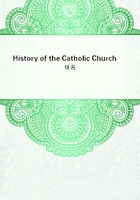
第157章
Though Billuart and many of his contemporaries, following in the footsteps of St. Thomas, dealt with both dogmatic and moral theology, the tendency to treat the latter as a distinct department and to give more attention to what may be termed the casuistical side of moral theology became more marked. To a certain extent, at least in manuals intended for the use of the clergy, such a method was rendered necessary by the frequent and more comprehensive character of the confessions. Yet it furnished some apparent justification for the onslaughts of the Jansenists, who thought that they detected in the new method a degradation of theology, a divorce between religion and casuistry, and a return to the unholy hair-splitting of the Pharisees.
Closely allied with the opposition to the new method adopted by the moral theologians was the controversy on Probabilism, that divided the schools during the greater part of the seventeenth and eighteenth centuries. In the practical solution of doubtful obligations Probabilism had been applied for centuries, but it was only towards the end of the sixteenth century that the principle was formulated definitely by the Dominican, De Medina. It was accepted immediately by a great body of the Jesuits, as well as by nearly all writers on moral theology. The Jansenists, however, in their eagerness to damage the reputation of their Jesuit opponents charged them with having introduced this novel and lax system of morals with the object of catering for the depraved tastes of their degenerate clients, and this charge when presented in a popular and telling style by their opponents created a distinctly unfavourable impression against the Society. The condemnation of Probabilism by the University of Louvain (1655) and the outcry raised against it by the Rigorist party led most of the religious orders and the secular clergy to abandon the system.
Two incidents that took place shortly afterwards helped to strengthen the anti-Probabilist party. One of these was the condemnation by the Holy See of certain very lax principles put forward by some theologians who labelled themselves Probabilists (1679), and the other was the decision given by Innocent XI.[3] in the case of the defence of Probabiliorism written by Thyrsus Gonzalez (1624-1705) afterwards general of the Jesuits. His superiors refused him permission to publish his work, and on appeal to the Pope this prohibition was removed (1680). But though the Pope certainly favoured Probabiliorism it is not clear that his decision gave any practical sanction to this opinion. Rigorism was dealt a severe blow by the condemnation issued by Alexander VIII. (1690), and in the end the influence and writings of St. Alphonsus put an end to both extremes.
Amongst the great theologians of the time were the Jesuit /Lacroix/(1652-1714), /Paul Gabriel Antoine, S.J./ (1679-1743) professor at the Jesuit College of Pont-a-Mousson, /Billuart/ (1685-1757), /Eusebius Amort/ (1692-1775), and the /Salmanticenses/, the Jesuit authors of the series on moral theology begun in Salamanca in 1665. But by far the most remarkable writer on moral theology during the eighteenth century was /Saint Alphonsus de' Liguori/[4] (1697-1787), the founder of the Redemptorists. A saint, a scholar, and a practical missionary, with a long and varied experience in the care of souls, he understood better than most of his contemporaries how to hold the scales fairly between laxity and rigorism. Though his views were attacked severely enough in his own time they found favour with the great body of theologians and the approbation given to them by the Church helped to put an end to the rigorist opinions, that remained even after their Jansenistic origin had been forgotten.
The spread of indifferentist or rationalist theories could not fail to weaken the reverence that had been inculcated by the early Reformers for the Bible as the sole source of God's revelation to men. Acting upon Luther's principle of private judgment others, regardless of their inspiration and infallibility, undertook to subject the Scriptures to the authority of human reason. Faustus Socinus (1539-1604), one of the founders of the Socinian sect, insisted that everything in the Scriptures that seems opposed to reason could not have come from God and should be eliminated. For some time while religious fervour was at its height both Lutherans and Calvinists held fast by their religious formularies and refused to accept the scriptural views of Socinus. But once dogmatic religion had been assailed by the new philosophico-rationalist school in England, Germany, and France the way was prepared for the acceptance of more liberal views. On the one hand, many of the extreme opponents of Christianity set themselves to point out the errors of the Bible, as a proof that it could not have come from God, while, on the other, many of the Protestant scholars, who still held by a divine Christian revelation, endeavoured to eliminate from it the supernatural without rejecting openly the authority of the Scriptures.
It was with this design that Jacob Semler (1725-91) formulated the Accommodation Theory, according to which Christ and His Apostles accommodated their actions and their language to the erroneous notions prevalent among the Jews in their time, and for this reason all that bordered upon the mysterious should be regarded merely as a surrender to contemporary superstition. Another method of arriving at a similar conclusion was adopted by Kant, who maintained that the Bible was written only to inculcate morality and to strengthen man's moral sense, and that all that is recorded in it must be interpreted by reason in the light of the object which its authors had in view.